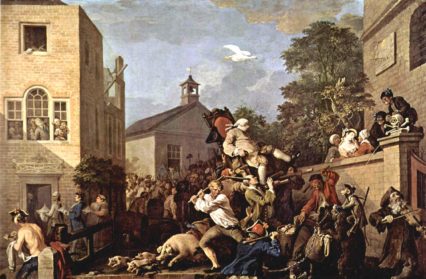Gareth Leaman asks what next for the cultural life and politics of Wales.
This is, we are told, a ‘post-factual age’. The EU referendum has seen myth collide with fact, and myth has won to devastating effect. It has been said that the UK has ‘had enough of experts’, and such a situation has proven to be fertile ground for a politics based on untruth.
Actually-existing politics – that is, the actions of the polis, rather than the mechanisms of Westminster, the Senedd and elsewhere – hinges upon the distribution of the sensible: people’s lived experience, what they see around them, how they perceive the world. Hegemony – the maintenance of a society’s dominant ideology – is built upon the creation of this perception, this ‘common sense’.
Common sense, David Harvey writes, can ‘be profoundly misleading, obfuscating or disguising real problems under cultural prejudices’. Thus a chasm is created between actually existing material conditions, and people’s perceptions of such. It is this chasm that sees the public, and the working class in particular, vote against their own interest.
We see this acted out with such grim inevitability here in Wales. The areas most in favour of leaving the EU are those that benefit the most from it. So how does it become ‘common sense’ that the EU is bad for Wales and the UK, and that leaving it is the solution?
Post-industrial Wales finds itself in a situation where jobs are growing scarce, and with it people’s ability to maintain a survivable standard of living. With the growing spectre of UKIP’s cryptofascism and the inability of the centre-left to fully commit to anti-austerity, our ‘common sense’ has deemed that immigration is the problem, and that leaving the EU will be the solution.
Yet areas of the UK that are deprived but have a much larger immigrant population than Wales – areas for whom the value of immigration is self-evident – seem to have come out in favour of Remain. Misleading common sense only holds sway when it remains unbroken by people’s lived experience, but in Wales the division between perception and political reality has remained intact. As a result, it seems that the public has voted to cripple the Welsh economy to solve a non-existent problem built largely upon myth.
The typical way of attempting to counter this mythmaking is to fight untruth with ‘truth’, to combat duplicity with cold, hard facts. The Remain campaign did precisely this, and it has failed utterly. In a time where people are desperate for solutions to the slide into ever-deeper austerity, pleas based on statistics, facts and objectivity have proven themselves to be powerless if they do not shake people’s own sense perception and lived experience.
Art, too, has attempted counter-hegemonic practice through these means: creating works that denounce dominant political ideologies, injecting an alternative viewpoint into people’s lives, disrupting this common sense perception, if only momentarily.
But art, like political campaigns based on the primacy of facts, has proved itself flimsy in this regard. If emotions (namely fear and uncertainty) can trump reason in shaping thought, where does this leave art’s potency to shape people’s perception of this political climate?
In the wake of crushing cuts to public subsidies, the arts in Wales seem fated to do nothing more than lament their own erosion from public life – whether it’s the Manics singing about (partly their own) political failures, or cultural celebrations that leave a nation more stultified than invigorated, mainstream Welsh culture seems to be incapable of articulating anything more than nihilistic nostalgia.
If economic precarity continues to increase in the coming weeks and months, it will be harder to maintain public ignorance of impending catastrophe. This is already happening in Cornwall (whose situation within the UK is similar to Wales’ in many ways), and will surely happen here too.
It will become apparent that fanning the flames of xenophobia is no panacea for the social reality of life under austerity. UKIP, the Tories and the Labour right will need to scramble for new myths, new scapegoats, ever-more duplicitous ways to mislead the public and maintain their own warping of common sense.
So how is this to be combated? How can a counter-hegemony be built if confrontation-via-fact has proven itself to be ineffective? What role can art play beyond articulating its own impotence? These are the questions that the left – Welsh artistic communities included – must address if there is to be any hope of combating the festering horrors unearthed by this referendum campaign.











